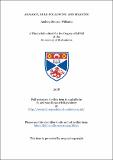Analogy, rule-following and meaning
Abstract
In this thesis, I argue that meaning something by a linguistic expression should be thought to consist,
not in following a rule, but in drawing an analogy. I argue that using a linguistic expression meaningfully
involves analogically extrapolating from our past experience of that expression, by observing a similarity
between the present instance (that which the expression is being applied to) and previous instances (our
past experiences involving the use of that expression). This is in opposition to the classical account of
meaning, according to which meaning something by a linguistic expression involves following a rule – a
rule stating necessary and jointly sufficient conditions for the expression to apply. I argue that there is no
one thing that all meaningful instances of many linguistic expressions have in common, such that its
meaning could be captured in the form of a rule. I claim that the categories corresponding to our
linguistic expressions (containing the objects that any given expression is true of), are defined not in
terms of necessary and jointly sufficient conditions, but in terms of family resemblance relationships
between particular instances, such that analogy plays an essential role in every meaningful application of
a linguistic expression. I argue that metaphorical uses of linguistic expressions are clearly dependent on
analogy, and that as we are unable to uphold a principled distinction between the literal and the
metaphorical, that all meaningful uses of language should be thought to depend on analogy. I argue that
conceiving of meaning as governed by analogy, rather than rules, helps to diffuse the rule-following
paradox, laid out by Saul Kripke. I claim that the meaning of every linguistic expression is governed by
analogy, including the word ‘rule’, such that there may be scope to speak of ‘rules’ of meaning, after all.
Type
Thesis, MPhil Master of Philosophy
Collections
Items in the St Andrews Research Repository are protected by copyright, with all rights reserved, unless otherwise indicated.

